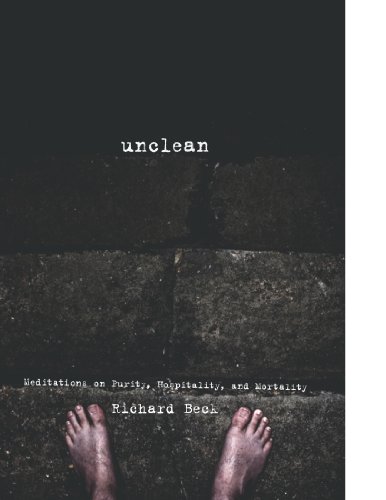I found the opening sentence to Unclean, by Richard Beck, to be revolting. But that was kind of the point. He begins his book with a thought exercise. “Imagine spitting into a Dixie cup. After doing so, how would you feel if you were asked to drink the contents of the cup?” (page 1).
And We’re Off!
Unclean, by Richard Beck attacks both the senses and sensibilities as Beck delves into the psychology of disgust in an attempt to understand Jesus’ quote of Hosea in Matthew 9:13, where he tells the Pharisees, “Go and learn what this means: ‘I desire mercy, and not sacrifice.’ For I came not to call the righteous, but the sinners.” Beck is very clear on his purpose and plan for writing. On page 3, he states “The central argument of this book is that the psychology of disgust and contamination regulates how many Christians reason with and experience notions of holiness, atonement, and sin.”
In other words, we are far more moved by what “ewwwwws” us than what “awes” us. Everyone swallows the saliva in their mouths, but once removed from the body, it’s no longer saliva but spit. The “otherness” disgusts us and influences us far more than we realize.
This expulsive act of disgust is also worrisome. Whenever disgust regulates our experience of holiness or purity we will find this expulsive element.
Page 16
“I Am Not a Theologian”
Beck is upfront about who he is and isn’t. On page 4, he makes it clear, “I am not a theologian or biblical scholar. I am an experimental psychologist.” Beck chairs the psychology department at Abilene Christian University. He spends a solid page offering
Beck builds a solid case; moving easily from evolutionary psychology, to biblical texts, to modern proclivities. All with a view of what Jesus’ call to what mercy should look like in the church. His examples are wide enough that I think everyone will find something they relate to. His points are solid enough that they hit hard.
The word for “differences” is
Page 117haireseis , from which we get the word heresy. The later technical definition of heresy was a difference of belief, but the original and more primitive notion of heresy was sociological division and exclusion. The Corinthian Christians were heretical in how they were erecting divisions between themselves.
The Corinthian Issue
I’m reading the book as a preacher, of course, looking for sermon material. There are numerous useful illustrations (though, given the disgust factor, many might be best suited to an audience of junior high boys). Beck cites various studies that uncover our notions of disgust and purity. They are all easily understandable and many are far too relatable. Again, though he confesses to not being a Bible scholar, Beck does some excellent exegesis of his passages.
Chapter 7 focuses on the issues surrounding the divisions in the Corinthian church. Beck’s explanations of Corinth’s divided community and Paul’s call for mutual love is amazing. His exploration of Paul’s “body of Christ” motif from 1 Corinthians 12, with its talk of honor and shame, is very well done.
It could be argued that hospitality—the welcoming of strangers—is the quintessential Christian practice. Welcoming sinners to table fellowship was a central, distinctive, and perhaps the most inflammatory aspect of Jesus’ ministry and teaching.
Page 121
Bringing it Back to the Table
Beck makes a solid case for recognizing that notions of disgust and contamination determine our acceptance and rejection of others rather than rationality. Our repulsion is far too often based on feelings of wrongness rather than any logical thought process. He refers to this process as “moral dumbfounding.” We know something is wrong . . . we simply can’t defend our judgment with words.
The four “moral situations” scenarios detailed in chapter 4 will leave you dumbfounded . . . and they’re likely to bother you a lot.
When moral dumbfounding comes to church, it causes us to determine who is in and out by our own visceral reactions rather than any biblical call to holiness and grace. In doing so, we miss Jesus’ call to mercy rather than sacrifice. Beck finds the correction and common ground we all need in an understanding of the call to hospitality and an invitation to table fellowship.
Beck’s remedy to our reactive repulsion is the Eucharist. He does a wonderful job in the final chapters identifying the place and need of the Lord’s Supper as a “regulating ritual in the life of the church” (pages 193-194), explaining how the Eucharist counters the “four disgust domains” detailed within the book.
As one of those Christians who weekly comes to the table, viewing communion as the centerpiece of the Sunday worship experience, I found Beck’s concluding focus both confirming and convicting. I cannot allow my gut feelings on sin and disgust to be the limiting factor to who I welcome to the table. There is nothing of Christ’s call to mercy in that reaction.
Unclean: Meditations
I will confess, I anticipated a much lighter read; a notion I based upon the use of the word “Meditations” in the title. These are not short devotional thoughts with which to start your mornings. This book demands digestion and time to process.
Beck seems to write with the understanding that most of us are out of our element here. He’s patient with his readers; gently bringing us along with plenty of recaps of material previously covered and warnings about what lay ahead. Busyness forced me to take a week-long break from reading; I worried that I would be lost when I returned to the book but found it surprisingly easy to pick back up where I left off.

Unclean, by Richard Beck contains plenty of fodder for sermons, Bible lessons, communion meditations, and self-study. Prepare to have your assumptions about the source of your notions of morality confronted.
And be prepared to never view a Dixie cup the same way again.

